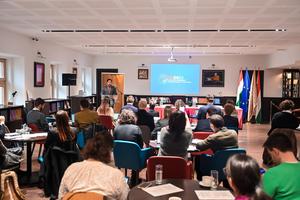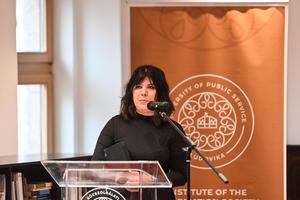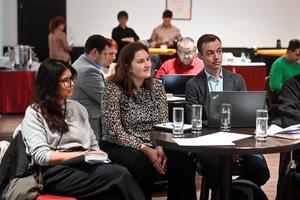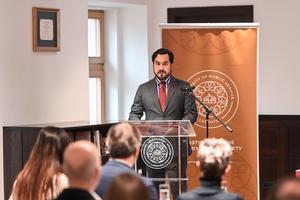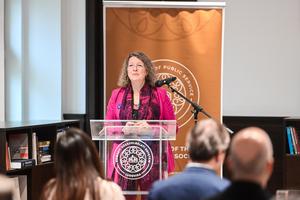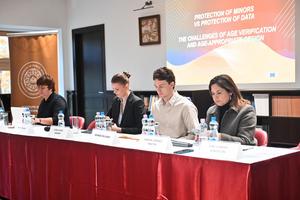Protection of minors vs protection of data - the challenges of age verification and age appropriate designs was the title of an expert workshop organised by the Institute of the Information Society of the Eötvös József Research Centre on 4 December in the John Lukacs Lounge of the University. Participants at the event, part of the European Union's rotating presidency programme, discussed how to use technology to protect children from unwanted content online. The aim of the event was to strike a balance between the application of child protection and data protection laws by involving different actors.
Pier Paolo Pigozzi, Vice-Rector for International Affairs of the Ludovika University of Public Service, welcomed the participants to the conference. He stressed that the conference, organised as part of an event sponsored by the Hungarian Presidency of the European Union, will provide an opportunity to discuss pressing issues at the intersection of technology, politics and child protection. He said that the university has played a significant role in the successful implementation of the Hungarian Presidency and is proud that Ludovika has the educational and research resources to host events of this and similar importance. The Vice- Rector stressed, "With every aspect of technology permeating our lives, ensuring the safety and well-being of our children has become a shared responsibility, and therefore not just a parental concern, but a technical challenge." Core values include protecting children, privacy and promoting safe, inclusive online spaces. This is particularly relevant as emerging technologies such as artificial intelligence offer new opportunities to protect vulnerable groups, but also to potentially exploit them. Safeguarding fundamental rights is essential, including the right to privacy, data protection and the freedom to use digital content responsibly. Striking this balance is a major challenge and requires breakthrough research and significant collaboration between different sectors.
An introductory presentation by June Lowery-Kingston, Head of Unit, Accessibility, Multilingualism and Safer Internet Unit at European Commission, focused on the impact of the digital world on children. She said that early access to digital platforms is worrying, as children are exposed to harmful content and therefore need to be protected. For example, the Australian model proposes radical solutions to protect children online. She also stressed children's rights, such as the right to freedom of expression and education. She also stressed children's rights, such as the right to freedom of expression and education. Technology solutions such as age verification play a key role in protecting children, while also ensuring data protection. She pointed out that the legal framework is currently incomplete, but several Member States have taken initiatives to improve the situation. Digital identity and the so-called European digital identity wallet have also been included in the design of future regulations to protect children and ensure seamless online safety.
The introductory presentations were followed by a panel discussion with Jeremy Bonan, Deputy Director of ARCOM France, Flora Stock-Kondrát, Legal Expert at the National Media and Infocommunications Authority, George Billinge, Founder of Illuminate Tech, Marisa Jimenez Martin, Director of Public Policy and Deputy Head of EU Affairs at Meta, and June Lowery-Kingston, moderated by Michèle Ledger, Head of practice at Cullen International. The discussion focused on an in-depth analysis of the challenges and strategies to protect children online, in particular with regard to age verification and regulatory frameworks. Flóra Stock-Kondrát highlighted Hungary's approach, stressing the need to develop detailed guidelines and the role of digital service coordinators. George Billinge, of Illuminate Tech, spoke about the Australian Government's experiment in age-assurance technology, stressing the vital role of efficient and non-discriminatory solutions. Marissa Jimenez Martin, representing Meta, discussed the company's online child protection efforts. The discussion also focused on the need to enforce regulations such as the EU's Digital Services Act (DSA) and the need for proper planning to ensure the security of online platforms.
The afternoon panel discussion, which included Katalin Baracsi, a lawyer specialised in Family Law and Infocommunication and also internet lawyer, Jeremy West, Head of the Digital Security and Safety Unit at the OECD, and Manon Baert, EU Advocacy and Policy Officer at 5RightsFoundation, focused on the aforementioned DSA Regulation and its implications for online safety and child protection. The DSA aims to create a level playing field in the digital world, providing a high level of safety and protection for minors. The regulation focuses on large online platforms, with stricter obligations for those with a significant EU user base. During the discussion, participants stressed the challenges of implementation, the need for clear guidelines and the clear importance of age-appropriate planning. In particular, the experts also highlighted the issue of integrating privacy and security, underlining the importance of integrating children's rights into planning. The panel also addressed the role of technical standards and the need for cooperation between regulators and stakeholders.
Text: Éva Harangozó
Photo: Dénes Szilágyi
